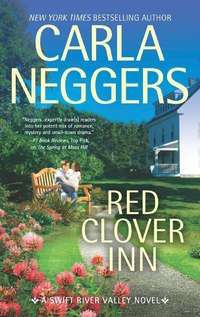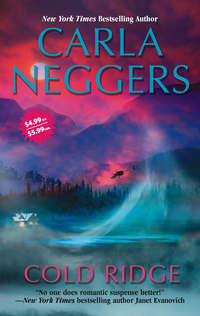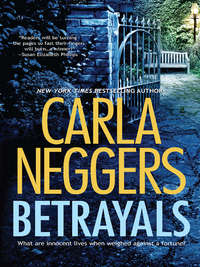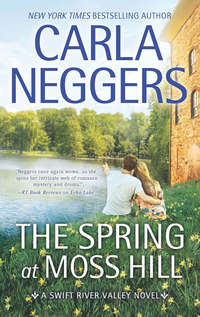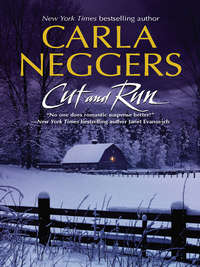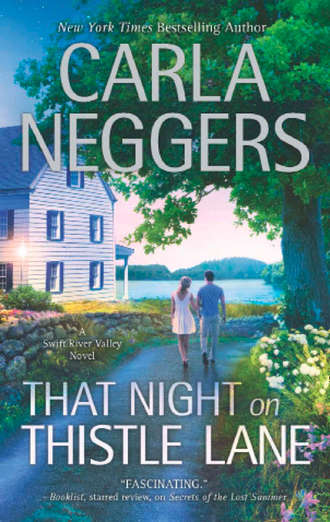
Полная версия
That Night on Thistle Lane

More than just make-believe
Librarian Phoebe O’Dunn deals in stories, but her passion for history has taught her that happy endings are rare. Her life in Knights Bridge, Massachusetts, is safe and uneventful…until she discovers the hidden room.
Among its secrets is a cache of vintage clothing, including a spectacular gown—perfect for a gala masquerade in Boston. In the guise of a princess, Phoebe is captivated by a handsome swashbuckler who’s also adopted a more daring persona. Noah Kendrick’s wealth has made him wary, especially of women: everybody wants something.
When Noah and Phoebe meet again in Knights Bridge, at first neither recognizes the other. And neither one is sure they can trust the magic of the night they shared—until an unexpected threat prompts them to unmask their truest selves.
After all, it takes more than just the right costume to live out your personal fairy tale. It takes heart…and the courage to be more than you ever dreamed.
Praise for

and her novels
“[A] beautifully described tale that rewards readers with an intriguing mystery as well as a deliciously satisfying romance.”
—Library Journal on Secrets of the Lost Summer
“Neggers captures readers’ attention with her usual flair and brilliance and gives us a romance, a mystery and a lesson in history.”
—Top Pick, RT Book Reviews on Secrets of the Lost Summer
“Only a writer as gifted as Carla Neggers could use so few words to convey so much action and emotional depth.”
—Sandra Brown
“With a great plot and excellent character development, Neggers’ thriller, Saint’s Gate, the first in a new series, is a fast-paced, action-packed tale of romantic suspense that will appeal to fans of Lisa Jackson and Lisa Gardner.”
—Library Journal
“Saint’s Gate is the best book yet from a writer at the absolute top of her craft.”
—Providence Journal
“Cold Pursuit is the perfect name for this riveting read. Neggers’ passages are so descriptive that one almost finds one’s teeth chattering from fear and anticipation.”
—Bookreporter.com
“[Neggers] forces her characters to confront issues of humanity, integrity and the multifaceted aspects of love without slowing the ever-quickening pace.”
—Publishers Weekly
That Night on
Thistle Lane
Carla
Neggers

www.mirabooks.co.uk
To my three sisters, Bonnie, Hilda and Gretchen—nothing like jumping into a cold brook on a hot summer day!
Contents
One
Two
Three
Four
Five
Six
Seven
Eight
Nine
Ten
Eleven
Twelve
Thirteen
Fourteen
Fifteen
Sixteen
Seventeen
Eighteen
Nineteen
Twenty
Twenty-One
Twenty-Two
Twenty-Three
Dear Reader
One
Bumblebees hummed in the frothy catmint on the edge of the stone terrace, the only sound to disturb the hot New England summer afternoon. Phoebe O’Dunn watched a solo bee hover above a purple blossom, as if debating what to do, then dart past the green-painted bench where she was seated and disappear across the herb and flower gardens. None of its fellow bumblebees followed.
Phoebe had met on the terrace with her sister Maggie and her friend Olivia Frost to discuss the upcoming vintage fashion show at their small-town library, but inevitably talk had turned to the charity masquerade ball tomorrow night in Boston, two hours away. Maggie and Olivia were going. Phoebe wasn’t, but she just might be able to help with costumes.
The dresses would be perfect.
If she’d had any doubts, they’d been dispelled when Maggie and Olivia sank into their chairs at the round, natural-wood table across the terrace and said they were stumped. With just twenty-four hours before they had to leave Knights Bridge for Boston, they had no idea what to wear.
Phoebe did. She’d already had the dresses cleaned and now they were hanging in the back room at her little house on Thistle Lane, just off the Knights Bridge common. She hadn’t mentioned them yet because—well, she didn’t know why, except that she couldn’t help feeling as if she were handling someone else’s secrets. She’d discovered the dresses two weeks ago in a mysterious hidden room in the library attic. So far she hadn’t told anyone about them or the room.
“We should have figured this out sooner,” Maggie said from the shaded table. Like Phoebe, Maggie had wild strawberry-blond hair, hers a tone darker and four inches shorter. And they had freckles. Lots of freckles, Maggie especially.
“Dylan didn’t give us much notice,” Olivia said without a hint of criticism. Her fiancé, Dylan McCaffrey, had purchased tickets to the masquerade ball to support the cause, a neonatal intensive care unit at a Boston hospital. He’d handed them to Olivia just before he and several friends took off to the White Mountains for a few days of hiking. She added with a sigh, “I’ve never been to a masquerade.”
“Neither have I,” Maggie said. “We must know someone in Boston who can help with costumes.”
Phoebe listened to the bumblebees hard at work in the catmint. She and Maggie had been friends with Olivia since preschool. They were gathered in Olivia’s backyard. Fair-haired and pretty, she’d returned to Knights Bridge in the spring to convert her classic 1803 center-chimney house into The Farm at Carriage Hill. In the process, she’d met and fallen in love with Dylan, a former hockey player, now a wealthy San Diego businessman. His arrival in Knights Bridge had turned the out-of-the-way rural Massachusetts town on its head.
Pushing back stray curls, Phoebe got to her feet. She and Maggie both wore sundresses and sandals, but Olivia had on shorts and an old T-shirt after spending the morning in her gardens. When she’d left Boston, she’d put her graphic design skills and boundless energy to work in transforming her historic house into an idyllic spot for showers, meetings, girlfriend weekends and the occasional wedding—including her sister’s upcoming wedding in September and her own in December.
“You’ve been awfully quiet, Phoebe,” Olivia said. “Any ideas what we could wear?”
“I was just thinking...” Phoebe tried to sound casual. “What if you two dressed up as Audrey Hepburn and Grace Kelly?”
Olivia pushed back her chair and eyed Phoebe with obvious interest. “How would we pull off Audrey Hepburn and Grace Kelly? Do you have something in mind?”
Maggie, a caterer with two young sons, stood with her iced tea, the sprig of peppermint and wedge of lemon that she’d artfully hooked onto the glass now floating among the ice cubes. She cast Phoebe an amused look. “Do you see me as Audrey Hepburn or Grace Kelly? Either one?”
Phoebe smiled at her sister. “Sure, why not?”
“You really do have an imagination,” Maggie said. “What are they, dresses that came in for the vintage fashion show?”
Phoebe hesitated, framing her explanation. As director of the Knights Bridge Free Public Library, the vintage fashion show was her brainchild, an end-of-the-summer event that would involve the entire community. It would showcase clothing from 1900 to 1975. The various library reading groups were focusing on twentieth-century books, the historical society was helping out, local businesses were donating food and staging materials—it was an all-consuming project that now, finally, was well in hand.
Phoebe had discovered the tiny hidden room while looking through the library attic for anything she could use for the show. It was as if she’d stepped into a time capsule, a secret hideaway. The room was filled with reproductions of dresses from movies up through the 1960s and from different historical periods—Medieval, Regency, Victorian, Edwardian, Roaring Twenties.
Who could have predicted such a thing?
She wanted to know more before she told anyone. Who had set up the room? Who had worked there, left everything behind? Why?
Did anyone else know about it?
She’d started volunteering at the library as a teenager and working there in college, and she’d never heard a word about a hidden attic room.
Finally she said, “Everyone’s been going through trunks and boxes in closets and attics for the fashion show. It’s been loads of fun so far.”
Olivia nodded. “I helped Gran load up her car trunk with old clothes from her and her friends. They’re all getting a kick out of the idea.”
“I can think of several dresses that would be perfect for a costume ball,” Phoebe said. “Two in particular. I’m not positive about sizes, but we can alter them if we need to.”
“Easier to take in a seam than let one out,” Maggie muttered.
“If we need to let out seams, we could add a strip of similar or contrasting fabric,” Olivia said. “It’s a costume ball. No one’s going to kick us out if our costumes are a little quirky.”
“You’ll be wearing masks, too,” Phoebe said.
“Ah, yes. Plausible deniability.” Olivia grinned, obviously liking that idea. “No one else has to know it’s me trying to pass myself off as Audrey Hepburn.”
“Not as Audrey Hepburn herself,” Phoebe amended. “As one of the characters she played.”
Olivia laughed. “Well, that just makes all the difference, doesn’t it? Hey, if one of these outfits works, I’m all for it.”
“Me, too,” Maggie said, with somewhat less confidence. “You’re sure it’s all right? We won’t be stepping on anyone’s toes borrowing a couple of the dresses?”
“It’ll be fine,” Phoebe said, leaving it at that. “Why don’t you come by my cottage later? We can open a bottle of wine and you can see if the dresses work for you.”
“What about you, Phoebe?” Olivia asked. “You have to come with us now. We can’t go off to the ball like the wicked stepsisters and leave you sweeping the ashes out of the fireplace. Dylan left a half-dozen tickets. No one will use them if we don’t.”
Whenever Olivia mentioned Dylan, Phoebe could see how very much her friend was in love with him.
A happy ending.
Phoebe’s favorite books and movies were ones with happy endings, and she welcomed a real-life romantic happy ending, as rare as it could be.
She waved off a bee that had found its way to her. “It’s very generous of Dylan. A neonatal ICU is a great cause, and it’ll be a wonderful night for everyone, I’m sure, but I can’t go.”
“Why not?” Maggie asked, obviously skeptical.
“I have things to do.” Phoebe glanced at her watch and winced. It really was later than she expected. “I have to get back to the library. I have story hour, but I’ll be home by six if you want to come by then.”
“We’ll be there,” Olivia said, then turned to Maggie. “I guess I shouldn’t speak for you.”
“Wouldn’t miss it,” Maggie said. “I want to see these dresses and I need a costume.”
Aware of her sister’s eyes on her, Phoebe offered to help clear the table of the iced-tea glasses and plates of tarts they had sampled for possible addition to the Carriage Hill catering menu, but Olivia shooed her away. “You need to get to story hour. The kids will get restless if you’re late.”
“An understatement,” Phoebe said with a smile as she snatched a tiny apple-pear tart. “This one’s my favorite, but they’re all fabulous. I’m off. I’ll see you later.”
Instead of going back through the house and disturbing Olivia’s dog, Buster, asleep in the mudroom, Phoebe followed a bark-mulch path through basil, oregano and dill plants soaking up the summer sun, then crossed a patch of shaded lawn and went around the side of the house to the front yard.
She had the door open to her Subaru, which she’d owned since she’d started commuting to the University of Massachusetts in nearby Amherst, when her sister burst out from the kitchen ell, a later addition to Olivia’s old house. Phoebe didn’t have a chance to get into the car before Maggie flew down the front walk and caught up with her.
“Phoebe, what on earth is wrong with you?”
She knew exactly what her sister was getting at. “I pay my own way, Maggie. You know that.”
“It’s not as if Dylan offered to pay off your mortgage for you. The tickets are his donation to a worthy cause. It looks good if the ball is well attended. It’s great publicity for the neonatal ICU and what it does, and it gets other people thinking about giving. Everyone wins.” Maggie sighed at her older sister. “We can’t be grinds all the time.”
“I’m not a grind,” Phoebe said. “I love what I do. I have fun—”
“And you live within your means and never take a false step,” Maggie finished for her, then winced. “Sorry. That came out wrong.”
“It’s okay. It’s just...” Phoebe stared at the tiny tart in her hand, suddenly wishing she had left it on the table. “It’s a slippery slope, wanting more than you can have, but I take lots of false steps. We all do. I’m not being morally superior.”
“Oh, Phoebe, I know. You’re the kindest person in Knights Bridge. Probably in all of New England.” Maggie’s rich turquoise eyes shone with emotion. “I just don’t want you to miss out on a good time.”
“Dressing you and Olivia for a masquerade will be a great time,” Phoebe said, smiling at her sister. “I have to go. Those boys of yours will be tearing up the library.”
Maggie groaned. “They’ll be full of energy after spending the day with Mom. She lets them do whatever they want. When I picked them up yesterday, they were helping her muck out the goat barn. Knee-deep in you-know-what. I wouldn’t care except they didn’t have a change of clothes. I’ll never get the smell out of my van.”
“It’ll wear off in time but you probably don’t want catering clients to get a whiff.”
“No kidding.”
Phoebe commiserated even as she was amused at the image of her mother and her young nephews. “I’ll see you in a little while. I hope I wasn’t rude to Olivia—”
“You weren’t, and she’d understand if you were. Don’t worry. She’s trying to figure out things herself. This is new territory for her. For Dylan, too. He never pictured himself living in a little town like Knights Bridge until he met Olivia. He obviously still loves San Diego, too.” Maggie stepped back from Phoebe’s car and waved a hand. “They’ll figure it out. I should have such problems.”
“What would you do with a fortune like Dylan has?”
Her eyes flashed with humor. “Get someone to paint my house. I hate ladders.”
Phoebe laughed as she climbed into her car, but she also felt a pang of uncertainty about what was next for Dylan and his millions, and what it would mean for quiet, picturesque Knights Bridge.
She left her car windows open and drove back toward town. She could smell the clean, cool water of a stream that ran along the edge of the narrow road. Carriage Hill was the last house on the dead-end road, two miles from the Knights Bridge village center. The road hadn’t always been a dead end. Once it had wound into the heart of the picturesque Swift River Valley. That was before four small valley towns were depopulated in the 1930s and deliberately flooded to create Quabbin Reservoir. The reservoir now provided pure drinking water for metropolitan Boston.
Boston must have seemed so far away back then.
It seemed far enough away now. Barely two hours, but so different from her life in Knights Bridge. She’d never lived anywhere else. Olivia and Maggie had both lived in Boston for a few years before returning to their hometown, Olivia in March, Maggie last fall. Phoebe’s biggest move had been from her mother’s house—or madhouse, as she and her sisters would say fondly—to her own place on Thistle Lane. It was a cottage, really. Perfect for just her. She could even walk to her job at the library.
Phoebe appreciated the peaceful back road as she pulled her thoughts together. Story hours were a favorite part of her job, but her visit with Maggie and Olivia had left her feeling edgy and frayed.
Questioning, wanting...dreaming.
I like my life, she reminded herself as she came into Knights Bridge center, known as one of the prettiest villages in New England with its shaded town common surrounded by classic houses, a town hall, library, church and country store.
Phoebe parked in front of the library, a solid, rambling brick building filled with endless nooks and crannies. Persistent stories said the library was haunted, to the point that the producers of a television series about ghosts had considered it for a show before choosing another supposedly haunted New England library. Phoebe often heard creaks, groans, moans, whistles and—once—what she would have sworn were whispers. But she’d never considered she might encounter an actual ghost.
Specifically, George Sanderson, founder of the library in 1872.
Upon his death in 1904, he left the library his extensive collection of books and archives, a Steinway baby grand piano and a dozen straw hats made at one of the small mills he’d owned in the valley. The last Sanderson had vacated Knights Bridge during the Depression, when the family mills were demolished ahead of the damming of the Swift River for Quabbin. Homes, businesses, barns, fences, trees—everything in the valley went. Even graves were moved to a new cemetery on the southern end of the reservoir.
Old George’s portrait still hung above the fireplace in the library’s main room. He was handsome and stern-looking, not exactly the sort Phoebe imagined would encourage story hours for small children. As she headed up the sunlit brick walk, she heard squeals of laughter through the open front window, where the children’s section was located.
Her five-year-old nephew, Aidan, Maggie’s younger son, pressed his face against the window screen. “Hey, Aunt Phoebe!”
“Aidan Sloan, do not poke that screen,” she said firmly, picking up her pace.
He giggled and disappeared from sight.
Phoebe ran up the steps and went inside, welcoming the cool, solid wood-paneled interior, hardly changed since the library was built to George Sanderson’s specifications. The main room included a small stage, the piano tucked on one end. Before Phoebe’s arrival as director, the library had seldom used the stage and the trustees had complained about the “wasted space.” With careful planning, she’d gained their support and found the money to launch a modest concert series, with musicians who didn’t expect more than a few dozen in the audience, and opened up the stage for art and garden shows. It was where the library would hold its vintage fashion show in less than two weeks.
We make use of all that we have.
That was Phoebe’s motto for the library as well as her own life. Why moan about what she didn’t have when so much was right within her grasp?
Her older nephew, Tyler, almost seven, was sitting cross-legged on the hardwood floor in front of the stage with a book about raptors in his lap. “Aunt Phoebe, did you know that raptors have three eyelids?”
“In fact, I did, Tyler.” She laughed. “You’d be surprised at what a librarian knows. Would you like to see a raptor’s eyelids sometime?”
He nodded eagerly.
“We’ll have to figure that out, then. Right now, though, let’s go in with the other kids.”
“I want to stay here.”
Tyler—as redheaded as his mother—preferred to read a book on his own than to be read to, especially with his squirming younger brother. Phoebe put out a hand, but he ignored it and stood up on his own. He shuffled past her into the children’s section, his head down, shoulders slumped, as if she’d asked him to walk the plank.
He and Aidan would be tired after spending most of the day with Elly O’Dunn, their energetic maternal grandmother. She’d taken the afternoon off from her job at the town offices to look after the boys while Maggie catered a lunch and then met with Olivia at Carriage Hill. Phoebe, her mother and her two youngest sisters were doing what they could to help Maggie as she managed two young boys and a catering business on her own, without Brandon Sloan, her adrenaline-junkie carpenter husband. Phoebe didn’t have all the details, but she knew Brandon’s construction work in Boston had been on-and-off at best the past year or so. It had to have put a strain on his marriage. He had a tendency to take off into the mountains or up the coast when things got tough, instead of talking.
Brandon was the third of six Sloan siblings—five brothers and a sister. His family owned a successful construction business in Knights Bridge and would welcome him back, but returning to his hometown would signal defeat in his eyes. Phoebe had known him since nursery school. He’d wanted out of Knights Bridge at ten. Then he and Maggie fell for each other as teenagers and married in college. Almost no one in town had believed their marriage would last. Phoebe had hoped it would, because they were so much in love.
She sighed. She could be such an idiotic romantic. Hadn’t she learned by now?
She gathered the dozen boys and girls onto a round, dark red rug. They came quickly to order, even her nephews. They were reading Beatrix Potter and had just started The Tale of Peter Rabbit, their last book of the summer, and they couldn’t wait to find out what happened next.
* * *
With Peter Rabbit and Knights Bridge’s little ones safely back with their families, Phoebe locked up the library and walked across South Main Street and through the common to Main Street and the Swift River Country Store, a town fixture for the past hundred years. It sold everything from galoshes to canned goods and fresh vegetables to a decent selection of wine. The afternoon heat had eased but it was still warm when she headed back to the library with two bottles of pinot grigio, already chilled. Olivia would bring a bottle of some kind of red from a California winery owned by Noah Kendrick, Dylan’s best friend and founder of NAK, Inc., the high-tech entertainment business that had made them both fortunes. The only thing Phoebe knew for sure was that her choice of white wine wouldn’t be nearly as pricey as whatever red Olivia brought.
Having a friend fall for a wealthy Californian had its unexpected advantages.
Normally she’d have walked home but her visit with Maggie and Olivia meant she had her car. She got in, set her wine on the front seat next to her and shut her eyes a moment, listening to the rustle of leaves as a gentle breeze floated through the shade trees on the wide library lawn.
Finally she started her Subaru and turned off South Main onto Thistle Lane. The library stood on the corner. Thistle Lane led away from the common, connecting to a back road with views of the reservoir in the distance. On her trips to the library as a girl, Phoebe had dreamed of living on the quiet, tree-lined street, away from the chaotic life she had out in the country with her parents and younger sisters. Thistle Lane represented order, independence and, at least to a degree, prosperity.
In less than five minutes, she turned into her short paved driveway. An old American elm graced the corner of the yard next to hers, holding on against the ravages of Dutch elm disease, in part due to intervention by the town. It was a beautiful tree, a symbol of the past and yet very much part of her everyday world. When she bought her house eighteen months ago, she’d thought she was being practical, never mind that she was the only one to make an offer. The house was built in 1912 by one of the early directors of the library, then sold to a series of owners, until, finally, the town was forced to take possession when the heir to the last owner couldn’t be located and property taxes went into arrears.





